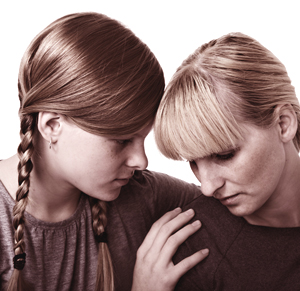Living With A Bipolar Mom

I grew up in Los Angeles with my older brother, younger sister and both of my parents. I've always had lots of friends and participated in tons of school activities, and I get pretty good grades. It was your average household--at least, that's what I thought until age 9 when I learned my mom was suffering from a mental illness.
My dad told the three of us about it one day when we were in the car with him. He said, "You've all probably noticed your mom can act strange sometimes. She gets really quiet and sad for months at a time and then, suddenly, she becomes really excited and hyper. She does this because she has a mental condition called bipolar disorder, or manic depression." Because we were all so young, none of us really understood what my dad meant, but we definitely had noticed that our mom had very extreme moods.
My first dear memory that something was wrong with my mom was about a year before my dad told us. For days at a time, I'd come home from school and find her lying on her bed with the blinds closed. That was scary--I had no idea if she was sick or just tired. I remember feeling sad and lonely because, like any kid, I wanted to come home and share my day with my mom ... but I couldn't. I figured my mom didn't want to be with me, which was pretty hard to handle.
Sometimes, my mom would be well enough to cook dinner, but lots of times she couldn't even do that, Other times, she'd have crazy outbursts, saying weird things and acting out until my father calmed her down.
WHO IS SHE THIS TIME?
Although my mom could seem normal for months, her extreme moods could last just as long. Usually when fall came around, she d be really manic but, in winter, she was usually super depressed. The good part about her manic episodes was that she felt she could conquer the world. She'd get excited about everything and do so many things with us. She'd have elaborate "First Sunday of the Month" parties at our house. In fact, that was one way I could tell she was entering a manic mood.
The bad side of her being manic was that she'd be irritable and say mean things. She imitated me in a whiny voice, like a bratty sib would do, which is totally weird coming from your mom. She didn't mean to hurt me, but it did. Then when winter came, the parties would stop and she'd just lie in the dark.
THOSE QUIRKY MOODS
Over time, my mom's moodiness made me more moody, too. What I'd find at home was always unpredictable, which kind of puts a girl on shaky ground. Having a bipolar morn is probably a lot like having a parent who is a drug addict or alcoholic in that they do crazy things without having any control over their behavior. In a way, that made me a little crazy, because I often blamed myself for the way my mom acted. Luckily, though, my dad is a really great parent, so I've never felt I was left to fend for myself.
Mom was always very open about her bipolar condition with her friends, but I only told my best friend since I didn't think my other friends would understand. Being bipolar is one of those illnesses that isn't so obvious that people can really see it and understand there's a big problem.
And, truthfully, sometimes even I would question if anything was really wrong with her. Until I was around 12, I thought I could make her better by constantly trying to cheer her up. But, after years of frustration, I realized I couldn't help her. I just learned to let her be, but even that was tough because I really wanted to be close with her.
LEARNING TO COPE
The best way I found to deal with my mom's condition was to throw myself into my schoolwork. Complaining or getting angry was useless since she had no control over her moods. So I just studied and read all the time, and that really provided an escape from what was happening at home. My little sister reacted pretty much the way I did, but my brother sometimes got really angry and frustrated with my mom. Arguing with her never got him anywhere, though, since my mom was helpless to act any different. That was always painful to watch.
Looking back, I realize I am really lucky because some kids with bipolar parents wind up drinking or doing drugs to take their minds off things. I was incredibly sad about my mom, but at least I was getting good grades. Having a mom who is so inconsistent with her moods could have really trashed my self-esteem but, fortunately, it didn't.
My dad is the one who held us all together. He'd take us out to dinner or bring in food and, over meals, talk to us about our mom's mental condition--maybe even excessively--just to make sure we didn't blame ourselves for how she acted toward us. He made us feel really loved and reminded us that our mom always loved us, too, no matter what mood she was in. That really helped.
About two years ago, my mom finally got the right medications for her disorder, and things have been so amazing since then. Now, I never have to worry about what mood she's in and how I should act around her, which is a huge relief. She's just her normal, incredible self all the time. It's like I have my mom back, and we're closer than ever.
GROUNDED ADVICE
Through all of those roller-coaster years, my mom became quite knowledgeable about mental illness so, about six years ago, she became a suicide prevention counselor. It's funny, though, because she started doing that work when she was in a manic stage and was feeling bored at home. But it has worked out great. In fact, after watching what she does, I decided last summer to take the 60-hour training course to become a volunteer teen counselor. Now, that's what I do for a 24-hour teen-to-teen hotline.
My advice to teens who have a bipolar parent is to remember the person who suffers from this mental illness cannot control his or her behavior. It's caused by a chemical imbalance, and anyone who suffers from it needs to be treated by medical professionals. Just know that it's not your fault, and it definitely doesn't mean you aren't loved. The best thing you can do if your parent is ill is to seek support from your other parent, a best friend, siblings, an understanding teacher or a counselor. You need someone to talk to because, if you don't get your feelings out, it's 20 times worse. I was lucky to have such a supportive dad, and that definitely helped me have a more healthy attitude about my mom's illness.
In fact, my mom's mental illness has actually made our family more solid. We all feel we can get through any problem without turning it into a major crisis. That also gives me confidence that when I get married and have kids, I will be able to work through anything. I've learned from my dad how important it is to talk things out with your loved ones and how to seek out help when you can't fix a problem on your own. If you have a parent who is bipolar, you can tough it out like I did. Honestly, it will make you stronger and more compassionate. It hasn't been easy, but I definitely feel I've become a better person for having gone through it.
POSTED IN Family

 become a contributor
become a contributor


















